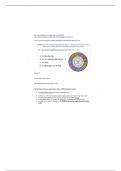Summary
BIO 140 Ultimate Final Exam Summary
- Course
- JMU Bio 140
- Institution
- James Madison University
This is a comprehensive and detailed final exam summary for Bio 140. *Essential!! *Contains Vital info, key concepts, definitions, diagrams....here to aid you to ace that final exam. Enjoy!!
[Show more]



